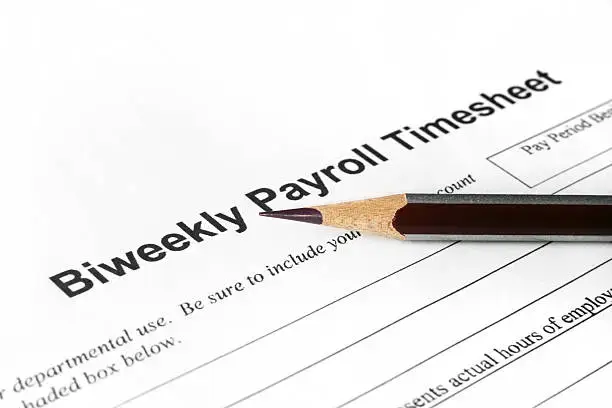Last Updated on March 20, 2023

As the world of work evolves, more and more people are turning to freelance as a way to earn a living. Freelancers are hired for a variety of tasks, ranging from writing and graphic design to website development and marketing.
One of the challenges of being a freelancer is managing cash flow, which includes getting paid in a timely and consistent manner. To address this challenge, many freelancers opt for a biweekly pay schedule.
In this article, we will explore what a biweekly pay schedule is, why freelancers should consider it, how to set it up, and the best practices for managing it. By following these guidelines, freelancers can ensure they are paid regularly, which can help them better manage their finances and achieve their business goals.
Understanding Biweekly Pay Schedule for Freelancers
A biweekly pay schedule is a payment arrangement where the employee receives their wages every two weeks, typically on a specific day of the week. This schedule is different from the weekly or monthly payment schedules, which pay employees every week or month, respectively. These schedules offer several advantages for both employees and employers.
For employees, biweekly pay schedules provide a more consistent cash flow than other payment schedules, which can help them better manage their finances. Employees can plan their budgets more effectively, knowing when they will receive their payments. Additionally, biweekly pay schedules may offer the convenience of automatic payments, which can eliminate the need for manual payments or checks.
Employers also benefit from biweekly pay schedules. This payment schedule can help employers reduce payroll processing costs and improve cash flow management. It also provides an easy way to track employee hours, wages, and overtime pay.
However, biweekly pay schedules may not be suitable for all industries or employees. Some employees may prefer weekly or monthly payment schedules, depending on their financial needs and obligations. Furthermore, certain industries, such as construction, may require different payment schedules due to the nature of the work.
To implement a biweekly pay schedule, employers must ensure that they comply with federal and state wage laws, such as minimum wage and overtime requirements. They must also choose a payment method and platform that is secure and easy to use. Finally, they must communicate clearly with their employees about the payment schedule, including payment due dates and any penalties for late payments.
Overall, biweekly pay schedules offer many benefits for both employers and employees, including improved cash flow management and reduced payroll processing costs.

How to Set Up the Schedule For Freelancers
Setting up a biweekly pay schedule for freelancers involves several steps that must be taken to ensure timely and consistent payments. First, freelancers must determine the payment amount and schedule that work best for them. This involves calculating the total amount owed for the project or assignment and dividing it into equal payments over two weeks. It is essential to ensure that the payment amount is reasonable and fair, both for the freelancer and the client.
Second, freelancers must choose a payment method and platform that are easy to use and secure. This may include online payment platforms such as PayPal or bank transfers. Freelancers should ensure that the payment method is convenient for their clients and secure to protect against fraudulent activity.
Third, freelancers must set clear payment terms and expectations with their clients. This includes specifying the payment due date and any penalties for late payments. Freelancers may also want to consider offering incentives for early or on-time payments, such as a discount or bonus.
Fourth, freelancers should keep accurate records of all payments received and invoices sent. This includes documenting the payment date, amount, and method of payment. Accurate record-keeping can help freelancers avoid disputes with clients and ensure that they are paid on time.
Finally, freelancers should review and adjust the payment schedule as needed. This may involve renegotiating payment terms with clients or adjusting the payment amount to reflect changes in the scope of work or project requirements.
Overall, setting up a biweekly pay schedule for freelancers involves careful planning, clear communication, and effective record-keeping. By following these guidelines, freelancers can ensure that they are paid on a regular and consistent basis, which can help them better manage their finances and achieve their business goals.
Tips for Managing Biweekly Pay Schedules for Freelancers
Managing a biweekly pay schedule as a freelancer can be challenging, but several tips can help freelancers stay on top of their finances and ensure timely payments.
Firstly, it is crucial to create a budget that accounts for both fixed and variable expenses. Fixed expenses, such as rent or mortgage payments, remain the same each month, while variable expenses, such as groceries or utilities, may vary. By creating a budget that accounts for these expenses, freelancers can better plan their cash flow and ensure that they have enough money to cover their expenses between pay periods.
Secondly, freelancers should have a system in place for tracking their invoices and payments. This may include using accounting software, spreadsheets, or a paper system to keep track of all payments and invoices. By having a reliable tracking system, freelancers can avoid missing payments or losing track of invoices.
Thirdly, it is important to communicate regularly with clients about payment expectations and due dates. Freelancers should send invoices promptly and follow up with clients if payments are late. Additionally, they may want to consider offering incentives for early or on-time payments, such as a discount or bonus.
Fourthly, freelancers should consider setting up automatic payments for recurring expenses. This can help ensure that bills are paid on time, even if the freelancer forgets to make the payment manually.
Finally, freelancers should be prepared for unexpected expenses or fluctuations in income. They may want to consider setting aside a portion of their income each pay period into a savings account or emergency fund to cover unexpected expenses or income gaps.
By following these tips, freelancers can stay on top of their finances and ensure a steady and consistent income.
Best Practices of the Pay Schedule For Freelancers
Adopting best practices for managing a biweekly pay schedule can help freelancers ensure that they are paid on time, avoid financial stress, and build a strong reputation with clients. Here are some best practices to consider:
1. Establish clear payment terms: Freelancers should set clear expectations with clients about payment terms, including payment due dates, accepted payment methods, and late payment penalties. This can help avoid confusion and ensure timely payments.
2. Use a reliable invoicing system: Freelancers should use a reliable invoicing system to send invoices promptly and track payments. This can help avoid missed payments and improve financial record-keeping.
3. Communicate regularly with clients: Regular communication with clients can help freelancers stay on top of payments and build strong relationships. This may include sending reminders about upcoming payments or following up on late payments.
4. Automate payments: Automating payments for recurring expenses, such as rent or utilities, can help ensure that bills are paid on time and avoid late fees.
5. Set aside savings: Freelancers should set aside a portion of their income each pay period into a savings account or emergency fund to prepare for unexpected expenses or income gaps.
6. Monitor cash flow: Freelancers should regularly monitor their cash flow to ensure that they have enough money to cover expenses between pay periods. This can help avoid financial stress and ensure that bills are paid on time.
7. Review and adjust payment terms: Freelancers should regularly review and adjust their payment terms as needed to ensure that they are fair and reasonable for both the freelancer and the client.
By adopting these best practices, freelancers can establish a reliable and sustainable biweekly pay schedule and build a successful freelance business.
Conclusion
Implementing a biweekly pay schedule as a freelancer can be challenging, but it is essential for ensuring timely payments, avoiding financial stress, and building a successful business. By following the tips and best practices outlined in this article, freelancers can establish a reliable and sustainable pay schedule and improve their financial management.
One additional recommendation is to seek out resources and support to help manage finances effectively. This may include working with a financial advisor, using accounting software, or joining a community of freelancers to share tips and advice. There are many resources available to freelancers that can help them manage their finances effectively and achieve long-term financial stability.
Ultimately, implementing a biweekly pay schedule requires careful planning, organization, and communication. By establishing clear payment terms, using a reliable invoicing system, and regularly communicating with clients, freelancers can ensure timely payments and build strong relationships with their clients. By following best practices such as automating payments, setting aside savings, and monitoring cash flow, freelancers can improve their financial management and build a successful freelance business. With the right strategies and resources, implementing a biweekly pay schedule can be a positive step toward achieving financial stability and success as a freelancer.
Before you go…
Hey, thank you for reading this blog to the end. I hope it was helpful. Let me tell you a little bit about Nicholas Idoko Technologies. We help businesses and companies build an online presence by developing web, mobile, desktop, and blockchain applications.
We also help aspiring software developers and programmers learn the skills they need to have a successful career. Take your first step to becoming a programming boss by joining our Learn To Code academy today!
Be sure to contact us if you need more information or have any questions! We are readily available.











